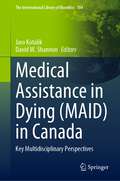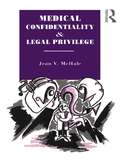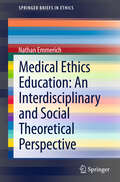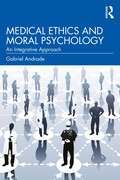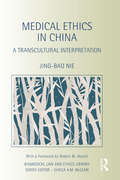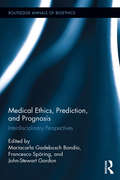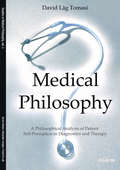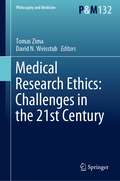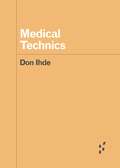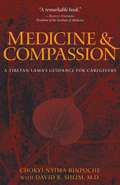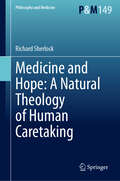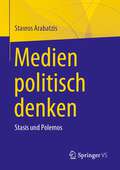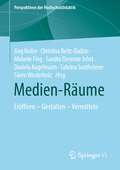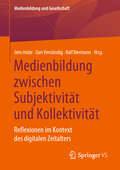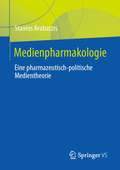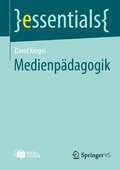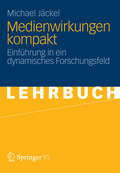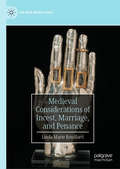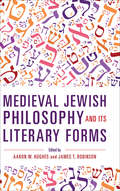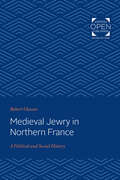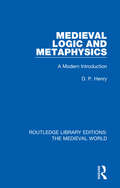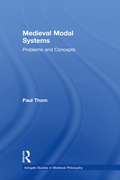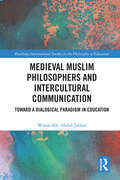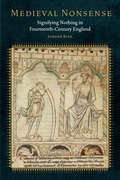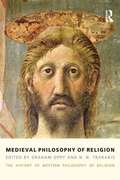- Table View
- List View
Medical Assistance in Dying: Key Multidisciplinary Perspectives (The International Library of Bioethics #104)
by Jaro Kotalik David W. ShannonThis book, written both for a Canadian and an international readership, provides a multidisciplinary review of the framework and performance of the Canadian Medical Assistance in Dying (MAID) program. In the first five years (2015-2021) of operation, this program delivered voluntary euthanasia and assistance in suicide to over 30,000 Canadian residents, presently representing a 30% annual growth. Looking back on these first five years, the 30 Canadian scholars and clinicians contributing to this volume raise important issues and attempt to answer key questions that have arisen in regards to its operation and its stated objectives. This volume strikes the most appropriate balance between the autonomy of persons who seek medical assistance, versus the interests and protection of vulnerable persons. Finally, the book makes suggestions on how the program can presently be improved. It identifies gaps in knowledge about MAID’s operational program and its impact on individuals, families and society in order to stimulate the necessary research that is essential to the evolution of a healthy and well-balanced program. As a first, comprehensive examination of medically assisted deaths in Canada, this publication will be of great value to lay, professional, academic, political audiences both domestically and internationally, especially in jurisdictions that are examining their options of permitting assisted deaths.
Medical Confidentiality and Legal Privilege (Social Ethics and Policy)
by Jean V. McHaleFirst Published in 2004. Routledge is an imprint of Taylor & Francis, an informa company.
Medical Ethics Education: An Interdisciplinary and Social Theoretical Perspective
by Nathan EmmerichThere is a diversity of 'ethical practices' within medicine as an institutionalised profession as well as a need for ethical specialists both in practice as well as in institutionalised roles. This Brief offers a social perspective on medical ethics education. It discusses a range of concepts relevant to educational theory and thus provides a basic illumination of the subject. Recent research in the sociology of medical education and the social theory of Pierre Bourdieu are covered. In the end, the themes of Bourdieuan Social Theory, socio-cultural apprenticeships and the 'characterological turn' in medical education are draw together the context of medical ethics education.
Medical Ethics and Moral Psychology: An Integrative Approach
by Gabriel AndradeMedical Ethics and Moral Psychology: An Integrative Approach is a pioneering book which provides a comprehensive exploration of the ethical challenges in contemporary healthcare. Seamlessly combining insights from medical ethics and moral psychology, this interdisciplinary work illuminates critical issues that have become particularly relevant in recent times, especially in the context of culture wars.This integrative approach enables readers to gain a deeper understanding of how moral decision-making is influenced by cognitive biases, societal attitudes, and philosophical frameworks. The book meticulously examines the complexities of vaccine mandates, addressing psychological resistance and conspiracy theories, while discussing self-defense arguments in abortion debates and the cognitive dissonance surrounding fetal personhood. It further provides a balanced analysis of euthanasia by navigating the nuanced distinctions between killing and letting die, and it interrogates the ethical implications of Assisted Reproductive Technologies amidst the clash of technological advancement and traditional values.By highlighting issues of justice in healthcare resource distribution, including systemic racism and equity, this work also equips readers with the tools necessary to engage thoughtfully with contemporary ethical dilemmas and the moral psychology aspects that contextualize them, fostering informed decision-making and the development of just healthcare policies with greater sensitivity and depth.Drawing on insights from psychology, sociology, anthropology and history to offer a comprehensive understanding of the complex dynamics shaping medical ethical decision-making, this is ideal reading for students and researchers in moral psychology, medical ethics, philosophy and public health. It is also designed for healthcare professionals, ethicists and policymakers.
Medical Ethics in China: A Transcultural Interpretation (Biomedical Law and Ethics Library)
by Jing-Bao NieDrawing on a wide range of primary historical and sociological sources and employing sharp philosophical analysis, this book investigates medical ethics from a Chinese-Western comparative perspective. In doing so, it offers a fascinating exploration of both cultural differences and commonalities exhibited by China and the West in medicine and medical ethics. The book carefully examines a number of key bioethical issues in the Chinese socio-cultural context including: attitudes toward foetuses; disclosure of information by medical professionals; informed consent; professional medical ethics; health promotion; feminist bioethics; and human rights. It not only provides insights into Chinese perspectives, but also sheds light on the appropriate methods for comparative cultural and ethical studies. Through his pioneering study, Jing-Bao Nie has put forward a theory of "trans-cultural bioethics," an ethical paradigm which upholds the primacy of morality whilst resisting cultural stereotypes, and appreciating the internal plurality, richness, dynamism and openness of medical ethics in any culture. Medical Ethics in China will be of particular interest to students and academics in the fields of Medical Law, Bioethics, Medical Ethics, Cross-Cultural Ethics as well as Chinese/Asian Studies and Comparative Cross-Cultural Studies.
Medical Ethics, Prediction, and Prognosis: Interdisciplinary Perspectives (Routledge Annals of Bioethics)
by John-Stewart Gordon Mariacarla Gadebusch Bondio Francesco SporingRecent scientific developments, in particular advances in pharmacogenetics and molecular genetics, have given rise to numerous predictive procedures for detecting predispositions to diseases in patients. This knowledge, however, does not necessarily promise benign results for either patients or health care professionals. The aim of this volume is to analyse issues related to prediction and prognosis as a burgeoning field of medicine, which is revolutionizing the way we understand and approach diagnosis and treatment. Combining epistemic and ethical reflection with medical expertise on contemporary practice and research, an interdisciplinary group of international experts critically examine anticipatory medicine from various perspectives, including history of medicine, bioethics, theories of science, and health economics. The highly complex issues involved in medical prediction call for a far-reaching debate on the value and scope of foreknowledge. For example, which responsibilities and burdens arise when still healthy people learn of their predisposition to diseases? How should health care insurance reflect risky life styles? Is the increasing medicalization of life connected with prevention ethically sustainable and financially possible in the developing world? These and other related issues are the subject of this timely and important book, which not only serves as an introduction to the area, but also proposes many feasible solutions to the problems outlined.
Medical Philosophy: A Philosophical Analysis of Patient Self-Perception in Diagnostics and Therapy (Studies in Medical Philosophy #1)
by David Låg TomasiThis innovative book clarifies the distinction between philosophy of medicine and medical philosophy, expanding the focus from the 'knowing that' of the first to the 'knowing how' of the latter. The idea of patient and provider self-discovery becomes the method and strategy at the basis of therapeutic treatment. It develops the concept of 'Central Medicine', aimed at overcoming the dichotomies of Western–Eastern medicine and Traditional–Integrative approaches. Evidence-based and patient-centered medicine are analyzed in the context of the debate on placebo and non-specific effects alongside clinical research on the patient-doctor relationship, and the interactive nature of human relationships in general, including factors such as environment, personal beliefs, and perspectives on life's meaning and purpose. Tomasi's research incorporates neuroscience, psychology, philosophy, and medicine in a clear, readable, and detailed way, satisfying the needs of professionals, students, and anyone who enjoys the exploration of the complexity of human mind, brain, and heart.
Medical Research Ethics: Challenges in the 21st Century (Philosophy and Medicine #132)
by David N. Weisstub Tomas ZimaThis book provides a current review of Medical Research Ethics on a global basis. The book contains chapters that are historically and philosophically reflective and aimed to promote a discussion about controversial and foundational aspects in the field. An elaborate group of chapters concentrates on key areas of medical research where there are core ethical issues that arise both in theory and practice: genetics, neuroscience, surgery, palliative care, diagnostics, risk and prediction, security, pandemic threats, finances, technology, and public policy.This book is suitable for use from the most basic introductory courses to the highest levels of expertise in multidisciplinary contexts. The insights and research by this group of top scholars in the field of bioethics is an indispensable read for medical students in bioethics seminars and courses as well as for philosophy of bioethics classes in departments of philosophy, nursing faculties, law schools where bioethics is linked to medical law, experts in comparative law and public health, international human rights, and is equally useful for policy planning in pharmaceutical companies.
Medical Technics (Forerunners: Ideas First)
by Don IhdeA personal account of the aging body and advanced technologies by a preeminent philosopher of technologyMedical Technics is a rigorous examination of how medical progress has modified our worlds and contributed to a virtual revolution in longevity. Don Ihde offers a unique autobiographical tour of medical events experienced in a decade, beginning in his 70s. Ihde offers experiential and postphenomenological analyses of technologies such as sonography and microsurgery, and ultimately asks what it means to increasingly become a cyborg. Forerunners: Ideas FirstShort books of thought-in-process scholarship, where intense analysis, questioning, and speculation take the lead
Medicine and Compassion
by Erik Pema Kunsang Harvey Fineberg Donald Fineberg Chokyi Nyima Rinpoche David R ShlimIt is estimated that some 54 million people in the U.S. act as informal caregivers for ill or disabled loved ones. We can add to these countless workers in the fields of health and human service, and yet there is still not enough help to go around: as many as three fourths of our informal caregivers report "going it alone." It's no wonder that "caregiver burnout" and depression afflict so many. Sure to be welcomed by caregivers of all types, the groundbreaking new Medicine and Compassion can help anyone reconnect with the true spirit of their caregiving task. In a clear and very modern voice, Chokyi Nyima Rinpoche and Dr. David R. Shlim use the teachings of Tibetan Buddhist philosophy to present practical tools for revitalizing the caring spirit. Readers, in turn, will find their patience, kindness, and effectiveness re-energized. Offering practical advice on dealing with people who are angry at their medical conditions or their care providers, people who are dying, or the families of those who are critically ill, Medicine and Compassion will strike resonant cords with medical professionals, hospice workers, teachers and parents of children with special needs, and those caring for aging and infirm loved ones.
Medicine and Hope: A Natural Theology of Human Caretaking (Philosophy and Medicine #149)
by Richard SherlockThis book expands, in a modest way, the discussion of hope and does so by focusing on a field where it is at the core of care-taking: medicine. The three great religious virtues of medieval theology were faith, hope, and love. An enormous literature exists about faith and love, but much less exists about hope. Doctors often know what they want to do for a patient but do not know whether they are able to have a good result. If they fail, will the result be worse? They must hope they can succeed. In other cases, they know what they can do but they are uncertain whether they should. If they do not undertake action, will the patient try to do it themselves with a much worse result? Questions such as these raise the issue of the importance of hope in medicine. This book builds on an insight from the first modern textbook of medical ethics, Thomas Percival’s 1803 classic Medical Ethics. There Percival says that the doctor is a “minister of hope to the sick”. This book analyses this concept, which is central to the practice of medicine.
Medien politisch denken: Stasis und Polemos
by Stavros ArabatzisDer hier vorgelegte Band möchte ‚Medien‛ von ihrem traditionellen Ort auf das politische Feld hin verlagern. Medien sind nämlich nicht nur als intellektuelles oder ästhetisches Spiel (kommunikatives, sprachliches, schriftliches, technisches, profitrationales, instrumentelles, hermeneutisches oder mathematisch-informatisches), vielmehr auch als politischer Ernstfall zu begreifen. Daher geht diese „Medientheorie‟ der Frage nach, „warum die Menschheit anstatt in einen wahrhaft menschlichen Zustand einzutreten, in eine neue Art von Barbarei versinkt‟ (Adorno/Horkheimer). Diese Frage, so unsere These, ist eine mediale, die aus der anfänglich ‚verkehrten Setzung‛ (kata-strophen) der Medien resultiert und dann ihren historisch-gesellschaftlichen, sozialen und politischen Fortschritt bestimmt. Die Hauptthese dieses Buches lautet, dass wir es in den ‚Medien‛ nicht mehr mit einem theoretischen, technisch-ästhetischen oder informatischen Spiel zu tun haben. Vielmehr mit dem politischen Ernstfall, wo es nämlich um Wahrheit oder Falschheit innerhalb der Polis und ihren jeweils geltenden Gesetzen geht. Es sind die zwei unterschiedlichen Bereiche (intellektuelles und ästhetisches Spiel hier und politischer Ernstfall dort), die nicht miteinander verwechselt werden dürfen, weil letzterer existenziell ist und darin um Leben oder Tod geht.Medien heute sind selbst zu den kulturellen, technischen, ökonomischen und politischen ‚Waffen‛ geworden, um darin ihr ‚Wesen‛ und ‚Unwesen‛ zu verbergen. Damit hat auch jene ‚technizistische Medientheorie‛ ihren metaphorischen Charakter verloren – der „Krieg als das Eigentliche der Medien‟ (Kittler) – und ist in den politischen, geopolitischen, finanz- und informationsökonomischen Raum überführt worden. Die medientheoretische These Kittlers (Medien als „Heeresgerät‟: Medien als ein zweckentfremdetes Kriegsgerät stellen eine Art Abfallprodukt dar, das solange in seiner Funktion verkannt wird, solange die primäre militärische Funktion ignoriert bleibt), ist somit, so unsere These in diesem Buch, nicht „technisch‟, sondern politisch (staatlich) und ökonomisch-gesellschaftlich-sozial (vorstaatlich) zu verstehen: Medientheorie als „Stasiologie‟ (Theorie des Bürgerkriegs) und „Polemologie‟ (Theorie des Kriegs). Ein antagonistisch-polemisches Prinzip, das alle Medien im öffentlichen Raum scharf stellt, so dass jenes „agonische‟ Kampfprinzip (C. Mouffe) nur eine Vorstufe dazu bildet und daher noch im Raum des Spiels verbleibt. Wir brauchen daher, so unsere abschließende These, kein technisches, hermeneutisches, ästhetisches, phänomenologisches, anthropologisches oder ontologisches Apriori, das Medien in ihrem Wesen oder Unwesen erklärt, sondern eine Stasiologie und eine polemologie, die das ganze antagonistisch-polemische Feld der Medien im öffentlichen Raum zu erschließen vermögen. Erst dieses Scharfstellen der Medien im öffentlichen Raum erlaubt es nämlich auch über dieses antagonistisch-polemische Prinzip hinauszugelangen.
Medien-Räume: Eröffnen – Gestalten – Vermitteln (Perspektiven der Hochschuldidaktik)
by Jörg Noller Christina Beitz-Radzio Daniela Kugelmann Sabrina Sontheimer Sören Westerholz Melanie Förg Sandra Eleonore JohstLehren und Lernen, verstanden als komplexe Vermittlung und Verarbeitung von Inhalten, findet immer in räumlichen Kontexten statt, die hinderlich oder förderlich sein können. Diese Räume können von ganz verschiedener Art sein und sie müssen sich keineswegs auf den Hörsaal und Seminarraum beschränken. Der Sammelband, der aus zwei Symposien des Münchner-Dozierenden-Netzwerks in den Jahren 2020 und 2021 hervorgegangen ist, möchte diese Räume erkunden, medial reflektieren und zugleich neue Räume für die Lehre eröffnen. Folgende Fragen stehen dabei im Zentrum: Welche Lehr- und Lernräume innerhalb und außerhalb der Hochschule haben sich bislang bewährt? Wo liegen ihre Grenzen, wo ihre Möglichkeiten? Wie lassen sich Lehr- und Lernräume gestalten? Welche Materialien, welche Technik und welche Medien haben sich bewährt oder bieten neue Möglichkeiten?
Medienbildung zwischen Subjektivität und Kollektivität: Reflexionen im Kontext des digitalen Zeitalters (Medienbildung und Gesellschaft #45)
by Ralf Biermann Dan Verständig Jens HolzeDer Band vereint ausgewählte interdisziplinäre Zugänge zu Entwicklungen und Problemstellungen rund um das Verhältnis von Subjektivität und Kollektivität. Die Autorinnen und Autoren gehen dabei der Frage nach, wie Konzepte von Subjektivität und Kollektivität im digitalen Zeitalter angemessen beschrieben und für eine zeitgenössische Theoriebildung gewendet werden können. Es werden Themen, wie kollektive Grenzüberschreitung, Vernetzung als Subjektivierungsform und sozio-mediale Habituskonfigurationen im Horizont der Medienbildung verhandelt. Damit leistet der Band auch einen Beitrag zum Diskurs um das Verhältnis von Bildung und Subjektivierung.
Medienpharmakologie: Eine pharmazeutisch-politische Medientheorie
by Stavros ArabatzisMit diesem Band wird so etwas wie eine medienphilosophische Apotheke und Arztpraxis eröffnet. Medien werden nicht mehr bloß technologisch, ästhetisch oder begrifflich-philosophisch erklärt, vielmehr genealogisch in ihrer pharmazeutischen, epidemiologischen, ärztlichen und gesellschaftlichen Wirkung nachgegangen. Als Mittel sind sie kein begriffliches, ästhetisches oder technisches Instrument, sondern Pharmaka einer ärztlich-politischen Kunst und Wissenschaft, die – seit Platon – Heilmittel aber auch Gift heißen können.
Medienpädagogik (essentials)
by David KergelDer vorliegende Band liefert eine kurze praxisorientierte Einführung in die Medienpädagogik. Dabei wird die Geschichte der Medienpädagogik von der Bewahrpädagogik über eine handlungs- und produktionsorientierte Medienpädagogik bis hin zum Begriff der Medienkompetenz dargestellt. Zudem werden Eckpunkte zeitgemäßer Medienpädagogik in einer digitalen Gesellschaft skizziert sowie die Rahmenbedingungen bzw. die Infrastruktur medienpädagogischen Arbeitens beschrieben. Ergänzt wird das Buch durch einen Onlinekurs. Den kostenlosen Zugang zum Onlinekurs finden Sie direkt im Buch.
Medieval Considerations of Incest, Marriage, and Penance (The New Middle Ages)
by Linda Marie RouillardMedieval Considerations of Incest, Marriage, and Penance focuses on the incest motif as used in numerous medieval narratives. Explaining the weakness of great rulers, such as Charlemagne, or the fall of legendary heroes, such as Arthur, incest stories also reflect on changes to the sacramental regulations and practices related to marriage and penance. Such changes demonstrate the Church's increasing authority over the daily lives and relationships of the laity. Treated here are a wide variety of medieval texts, using as a central reference point Philippe de Rémi's thirteenth-century La Manekine, which presents one lay author's reflections on the role of consent in marriage, the nature of contrition and forgiveness, and even the meaning of relics. Studying a variety of genres including medieval romance, epic, miracles, and drama along with modern memoirs, films, and novels, Linda Rouillard emphasizes connections between medieval and modern social concerns. Rouillard concludes with a consideration of the legacy of the incest motif for the twenty-first century, including survivor narratives, and new incest anxieties associated with assisted reproductive technology.
Medieval Jewish Philosophy and Its Literary Forms (New Jewish Philosophy and Thought)
by Edited by Aaron W. Hughes and James T. Robinson&“This well-written, accessible [essay] collection demonstrates a maturation in Jewish studies and medieval philosophy&” (Choice). Too often the study of philosophical texts is carried out in ways that do not pay significant attention to how the ideas contained within them are presented, articulated, and developed. This was not always the case. The contributors to this collected work consider Jewish philosophy in the medieval period, when new genres and forms of written expression were flourishing in the wake of renewed interest in ancient philosophy. Many medieval Jewish philosophers were highly accomplished poets, for example, and made conscious efforts to write in a poetic style. This volume turns attention to the connections that medieval Jewish thinkers made between the literary, the exegetical, the philosophical, and the mystical to shed light on the creativity and diversity of medieval thought. As they broaden the scope of what counts as medieval Jewish philosophy, the essays collected here consider questions about how an argument is formed, how text is put into the service of philosophy, and the social and intellectual environment in which philosophical texts were produced.
Medieval Jewry in Northern France: A Political and Social History (The Johns Hopkins University Studies in Historical and Political Science)
by Robert ChazanOriginally published in 1974. Focusing on a set of Jewish communities, Robert Chazan tells how, by the eleventh century, French Jews had created for themselves a role as local merchants and moneylenders in adapting to the political, economic, and social limits imposed on them. French society, striving to become more powerful and civilized, was willing to extend aid and protection to the Jews in return for general stimulation of trade and urban life and for the immediate profit realized from taxation. While the authorities were relatively successful in protecting the Jews from others, there was no power to impose itself between the Jews and their protectors. The political and social well-being of the Jews was, therefore, dependent on the will of the governing authorities who taxed their holdings and regulated their activities. During the twelfth and thirteenth centuries, the position of the Jews was constantly under attack by reform elements in the church concerned with Jewish moneylending and blasphemous materials in Jewish books; these reformers were eventually devoted to a serious missionizing effort within the Jewish community. The Jews' situation was further complicated by deep popular animosity, expressing itself in a damaging set of slanders and occasionally in physical violence. Despite the impressive achievements of the Jews in medieval northern France, by the thirteenth century their community was increasingly constricted; and in 1306, they were expelled from royal France by Philip IV. Overcoming the handicap of a lack of copious source material, Chazan analyzes the Jews' political status, their relations with key elements of Christian society, their demographic development, their economic outlets, their internal organization, and their attitudes toward the Christian environment. As it highlights aspects of French society from an unusual perspective, Medieval Jewry in Northern France should be of special interest to the historian of medieval France as well as to the student of Jewish history. This story is also significant for all who are fascinated by the capacity of human groups to respond and adapt creatively to a hostile and limiting environment.
Medieval Logic and Metaphysics: A Modern Introduction (Routledge Library Editions: The Medieval World #13)
by D.P. HenryOriginally published in 1972, Medieval Logic and Metaphysics shows how formal logic can be used in the clarification of philosophical problems. An elementary exposition of Leśniewski’s Onotology, an important system of contemporary logic, is followed by studies of central philosophical themes such as Negation and Non-being, Essence and Existence, Meaning and Reference, Part and Whole. Philosophers and theologians discussed include St Anselm, St Thomas Aquinas, Abelard, Ockham, Scotus, Hume and Russell.
Medieval Modal Systems: Problems and Concepts (Ashgate Studies in Medieval Philosophy)
by Paul ThomThis book explores noteworthy approaches to modal syllogistic adopted by medieval logicians including Abélard, Albert the Great, Avicenna, Averröes, Jean Buridan, Richard Campsall, Robert Kilwardby, and William of Ockham. The book situates these approaches in relation to Aristotle's discussion in the Prior and Posterior Analytics, and other parts of the Organon, but also in relation to the thought of Alexander of Aphrodisias and Boethius on the one hand, and to modern interpretations of the modal syllogistic on the other. Problems explored include: Aristotle's doctrine of modal conversion, the pure and mixed necessity-moods, modal ecthesis, the pure and mixed contingency-moods, and Aristotle's use of counter-examples. Medieval logicians brought various concepts to bear on these problems, including the distinction between per se and per accidens terms, the notion of essential predication, the distinction between ut nunc and simpliciter propositions, the distinction between de dicto and de re modals, and the notion of ampliation. All these are examined in this book.
Medieval Muslim Philosophers and Intercultural Communication: Towards a Dialogical Paradigm in Education (Routledge International Studies in the Philosophy of Education)
by Wisam Kh. Abdul-JabbarThis book examines the works of Medieval Muslim philosophers interested in intercultural encounters and how receptive Islam is to foreign thought, to serve as a dialogical model, grounded in intercultural communications, for Islamic and Arabic education. The philosophers studied in this project were instructors, tutors, or teachers, such as Al-Kindi, Al-Farabi, Al-Ghazali, and Averroes, whose philosophical contributions directly or indirectly advanced intercultural learning. The book describes and provides examples of how each of these philosophers engaged with intercultural encounters, and asks how their philosophies can contribute to infusing intercultural ethics and practices into curriculum theorizing. First, it explores selected works of medieval Muslim philosophers from an intercultural perspective to formulate a dialogical paradigm that informs and enriches Muslim education. Second, it frames intercultural education as a catalyst to guide Muslim communities’ interactions and identity construction, encouraging flexibility, tolerance, deliberation, and plurality. Third, it bridges the gap between medieval tradition and modern thought by promoting interdisciplinary connections and redrawing intercultural boundaries outside disciplinary limits. This study demonstrates that the dialogical domain that guides intercultural contact becomes a curriculum-oriented structure with Al-Kindi, a tripartite pedagogical model with Al-Fārābī, a sojourner experience with Al-Ghazali, and a deliberative pedagogy of alternatives with Averroes. Therefore, the book speaks to readers interested in the potential of dialogue in education, intercultural communication, and Islamic thought research. Crucially bridging the gap between medieval tradition and modern thought by promoting interdisciplinary connections and redrawing intercultural boundaries outside disciplinary limits, it will speak to readers interested in the dialogue between education, intercultural communication, and Islamic thought. .
Medieval Nonsense: Signifying Nothing in Fourteenth-Century England (Fordham Series in Medieval Studies)
by Jordan KirkFive hundred years before “Jabberwocky” and Tender Buttons, writers were already preoccupied with the question of nonsense. But even as the prevalence in medieval texts of gibberish, babble, birdsong, and allusions to bare voice has come into view in recent years, an impression persists that these phenomena are exceptions that prove the rule of the period’s theologically motivated commitment to the kernel of meaning over and against the shell of the mere letter.This book shows that, to the contrary, the foundational object of study of medieval linguistic thought was vox non-significativa, the utterance insofar as it means nothing whatsoever, and that this fact was not lost on medieval writers of various kinds. In a series of close and unorthodox readings of works by Priscian, Boethius, Augustine, Walter Burley, Geoffrey Chaucer, and the anonymous authors of the Cloud of Unknowing and St. Erkenwald, it inquires into the way that a number of fourteenth-century writers recognized possibilities inherent in the accounts of language transmitted to them from antiquity and transformed those accounts into new ideas, forms, and practices of non-signification. Retrieving a premodern hermeneutics of obscurity in order to provide materials for an archeology of the category of the literary, Medieval Nonsense shows how these medieval linguistic textbooks, mystical treatises, and poems were engineered in such a way as to arrest the faculty of interpretation and force it to focus on the extinguishing of sense that occurs in the encounter with language itself.
Medieval Philosophy of Religion: The History of Western Philosophy of Religion, Volume 2
by Graham Oppy N. N. TrakakisThe Medieval period was one of the richest eras for the philosophical study of religion. Covering the period from the 6th to the 16th century, reaching into the Renaissance, "The History of Western Philosophy of Religion 2" shows how Christian, Islamic and Jewish thinkers explicated and defended their religious faith in light of the philosophical traditions they inherited from the ancient Greeks and Romans. The enterprise of 'faith seeking understanding', as it was dubbed by the medievals themselves, emerges as a vibrant encounter between - and a complex synthesis of - the Platonic, Aristotelian and Hellenistic traditions of antiquity on the one hand, and the scholastic and monastic religious schools of the medieval West, on the other. "Medieval Philosophy of Religion" will be of interest to scholars and students of Philosophy, Medieval Studies, the History of Ideas, and Religion, while remaining accessible to any interested in the rich cultural heritage of medieval religious thought.
